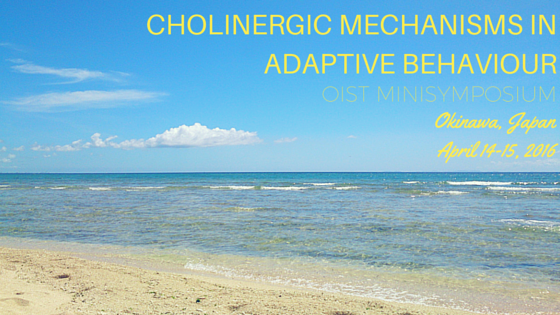OIST Minisymposium: Cholinergic Mechanisms in Adaptive Behaviour

Organizers
Aim
The goal of this symposium is to bring together a group of leading researchers investigating the role of acetylcholine within brain circuits responsible for learning and behavior. Acetylcholine has long been known to play a crucial role in adaptive behavior, but the limited access to the cholinergic neurons which release acetylcholine has limited progress. The recent availability of genetic approaches to targeting cholinergic neurons for experimental study, combined with sophisticated electrophysiological, behavioral and imaging approaches, has led to an explosion of new findings. The field is on the cusp of a major advance in understanding the role of acetylcholine at cellular, circuit, and system levels. In bringing this group together we aim to take an important step toward an integrated concept of the contribution of acetylcholine to higher brain function, and the underlying neural mechanisms, by discussing the following issues:
- How to integrate the most recent results into a coherent concept of the role of acetylcholine.
- What causal and correlative evidence supports recent proposals regarding cholinergic function.
- How do cholinergic effects interact with actions of other neuromodulators such as dopamine and serotonin?
- What is the contribution of acetylcholine to overall brain function, focusing on the basal ganglia, and thalamocortical interactions?
Invited Participants
Program
James Surmeier (Northwestern University, USA)
Striatal cholinergic interneurons and Parkinson’s disease
Andrew Sharott (University of Oxford, UK)
Temporal activity signatures of striatal cholinergic interneurons are conserved across rodents and primates
Discussion led by Stefano Zucca
12:00- 3:00 pm
Afternoon
3:00 – 7:00 pm
Placing a brake and taking a break: How striatal cholinergic interneurons gate dopamine release and pause their own activity
Roles of acetylcholine and dopamine in motor and reward behaviors
David Lovinger (NIH-NIAAA, USA)
Dopamine D2 receptors on striatal cholinergic neurons contribute to instrumental learning
Discussion led by Aya Zucca
Day Two - Friday, April 15, 2016
Cholinergic Mechanisms: behaviour perspectives on circuitry
Morning
9:00 - 1:00 pm
Cholinergic modulation and choice between goal-directed actions
Angela Langdon (Princeton, USA)
A role for cholinergic interneurons in gating reward predictions in the ventral striatum
Kazuto Kobayashi (Fukushima Medical University, Japan)
Roles of striatal cholinergic interneurons revealed by genetic cell targeting
Discussion led by Gordon Arbuthnott
Lunch
1:00 - 2:00 pm
Afternoon
2:00 – 6:00 pm
Cholinergic mechanism of reward prediction error computation for reinforcement learning in the pedunculopontine tegmental nucleus neurons.
Anastasia Christakou (University of Reading, UK)
Structural and neurochemical imaging of the human striatal cholinergic system
Genela Morris (University of Haifa, Israel)
Monitoring activity of putative cholinergic interneurons (CINs) in dorsomedial striatum during learning of a multidimensional set learning task
Discussion led by Jeff Wickens
To register for this minisymposium click here.



